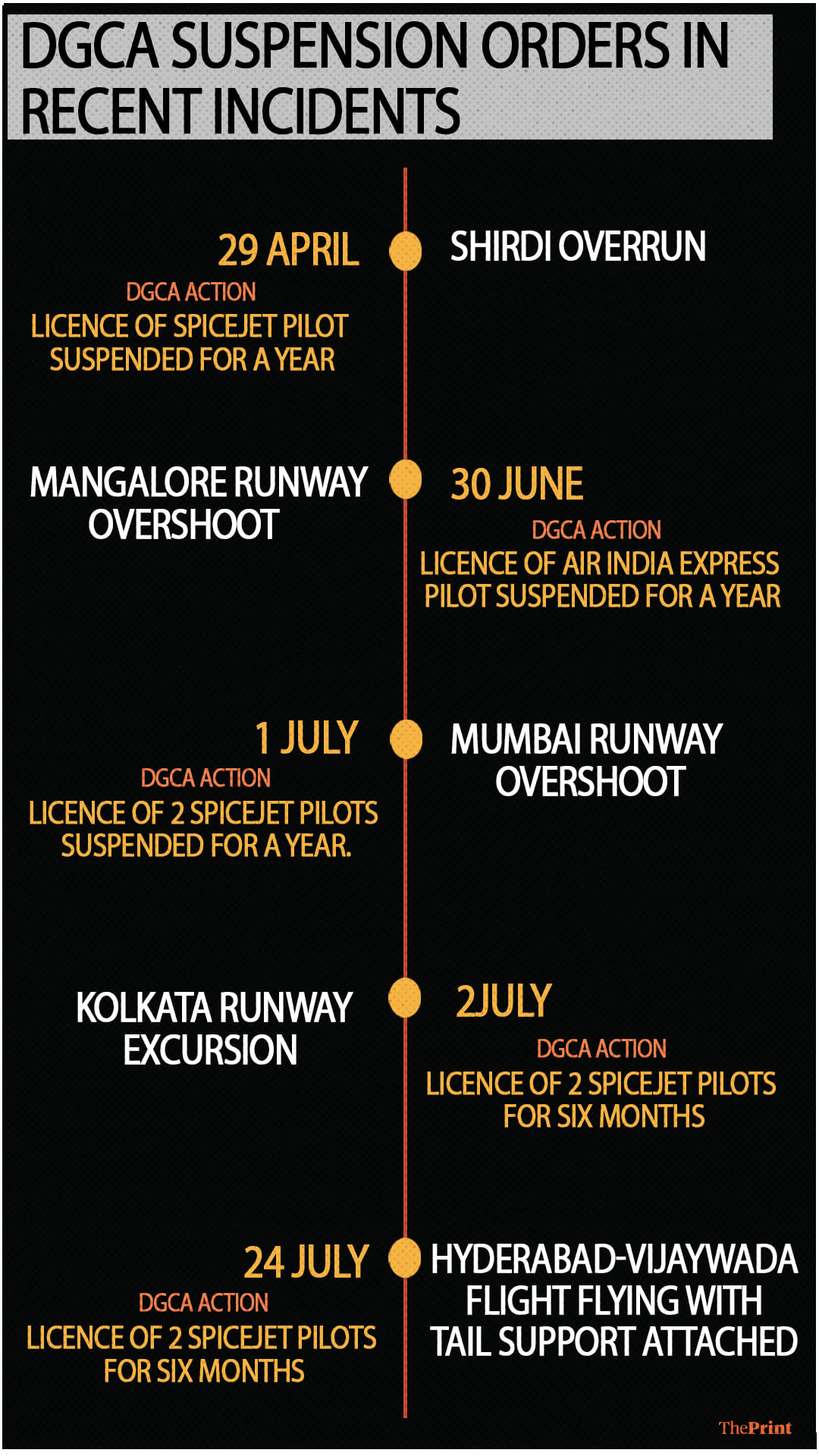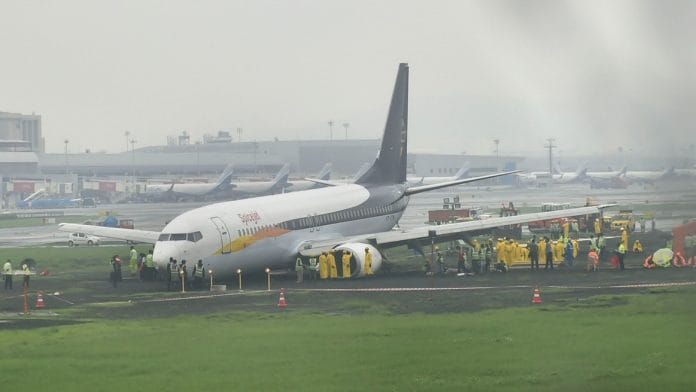New Delhi: Over the last eight months, the Directorate General of Civil Aviation (DGCA) has grounded 74 pilots, of whom 41, or 55 per cent, were suspended for their alleged involvement in aviation-related accidents endangering the safety of the aircraft and passengers on board.
The remaining 33 were grounded for failing the breathalyser test, which determines if pilots are under the influence of alcohol while on duty.
The DGCA shared these figures, for between January and August 2019, in response to an RTI query seeking year-wise details of pilots suspended in the last two years. The aviation regulator, however, refused to disclose the details of pilots and airlines involved in the incidents.
The RTI reply also showed that 262 pilots were suspended between 2017 and August 2019 for various reasons. Of these, 98 pilots were suspended in 2017 while 90 pilots were grounded in 2018.

A senior DGCA official, however, told ThePrint that the number of pilots suspended for their involvement in accidents, some of them serious, has risen sharply this year.
“In 2017, there was one case when the crew was de-rostered for a considerable time but was not formally punished; so, basically there wasn’t any accident-related suspension in that year,” the official said. “In 2018, 11 pilots were suspended in cases of accidents. But in these eight months, 41 pilots have already been suspended. This is because there is more accountability and a more serious DGCA response in matters of safety.”
Also read: DGCA to counsel airline crew as mid-flight TikTok videos flood the web
What constitutes an accident?
According to the DGCA’s Aircraft (Investigation of Accidents and Incidents) Rules, 2017, an “accident” includes “an occurrence associated with the operation of an aircraft” in which either a person inside the aircraft is seriously injured or a person in contact with the aircraft is injured.
A serious accident includes a scenario where the aircraft sustains damage or structural failure of the kind specified in the provision, and where the aircraft goes missing or is completely inaccessible.
Another senior DGCA official said the punishment for being involved in accidents “depends on the seriousness of the event and ranges between two months to a year”.
“Suppose the failure is very serious in certain cases, which could have been threatening and could have led to a disaster, the pilots involved are severely punished,” the official said. “However, there is an appeal process if punishment is meted out to someone who has been found guilty of negligence; it is a two-tiered appeal process.”
“If the punished person is not satisfied with the order then he or she can file an appeal, which is further is reviewed at two levels,” the official added. “Thereafter all the legal windows are opened.”
While the DGCA refused to divulge details of the pilots or aircraft involved in the accidents, it has taken action in some high-profile cases recently (see box).

Not everyone, however, is convinced by the DGCA’s recent actions.
Amit Singh, former head of operations, safety, Air Asia, and former head of training, Indigo, said the DGCA has refused to provide reasons for the suspensions.
“After a recent spike in the number of flight safety-related incidents in India, the regulator resorted to suspending the flying licence of the crew without providing specific reasons or determining the root cause of the incidents,” Singh said. “How can a punitive action be based on prima facie evidence. Licence suspension for varying periods has now become a norm. The SC ruling must be a benchmark for restricting the period of suspension to 90 days.”
Also read: These are the reasons why Indian planes are skidding off runways, says DGCA audit
The breathalyser test
The breathalyser test is used to determine if the crew or pilots are under the influence of alcohol while on duty. On 16 September 2019, the DGCA issued fresh instructions stating that from now on, the breathalyser test will be conducted at all airports for all air traffic controllers, aircraft engineers and ground handling crew as well.
According to DGCA rules, if any personnel tests positive for alcohol for the first time, or refuses to undergo the test, or attempts to evade it by leaving the airport premises, he or she must be kept “off duty and their licence/approval shall be suspended for a period of three months”.
“In the case of a second violation, the licence shall be suspended for a period of one year. In the case of a third violation, the licence will be suspended for three years and a fourth violation will result in a lifetime ban,” the rules state.
Also read: DGCA ropes in IITs, five international firms to take on rogue drones flying near airports
- The copy has been updated to incorporate the infographic on pilots being suspended.







Excellent move to have alert and sharp minds in cockpit. It will be wonderful to have all govt officers, legislators and jurors do the same. Alvi positive, No Decision to affect Indian lives!! Penalties may well be discussed and decided.
Saudi oil matter not matter for India finance
By
All India general secretary
National democracy Party
Ahmed Marecar